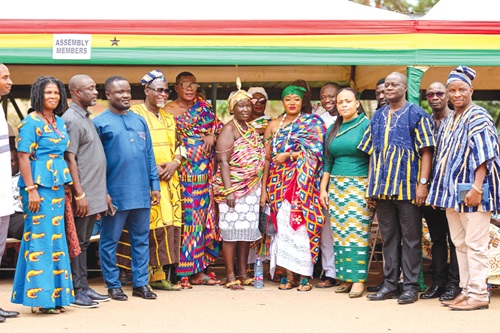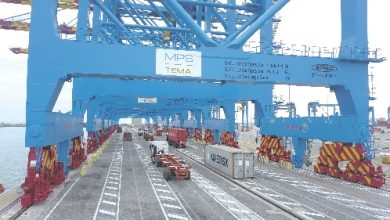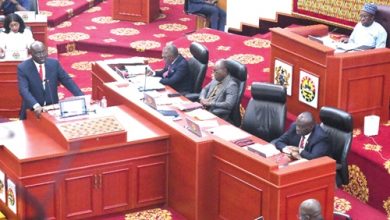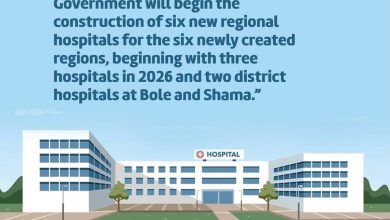Ahanta West MP brings Ahanta language to classroom
Ahanta West MP brings Ahanta language to classroom

Ahanta, one of Ghana’s most at-risk indigenous languages, is now to be studied in school.
This is the result of an initiative introduced by the Member of Parliament for the Ahanta West Constituency, Mavis Kuukua Bissue.
The Ahanta Language Renaissance Project (ALRP), a grassroots-driven agenda started by Madam Bissue, the first female MP elected on the ticket of the National Democratic Congress (NDC), has now launched the pilot phase of the initiative, starting in the Ahanta West Municipality.
On Friday, July 4, 2025, Madam Bissue convened a grand durbar of the chiefs and people of Ahanta to outdoor the initiative.
Endanger language
Her motivation, in her welcome address at the durbar, was her personal story of not having the opportunity to learn the Ahanta language as a child, despite being born to an Ahanta mother and father.
“I am an example of the dangers that lie ahead if we fail as a country to document and teach our indigenous languages.
“Despite being born to an Ahanta father and mother, I did not have the benefit of being taught the language at home or in school.
We had no books from which I could read my language and travelling and living out of Ghana for more than 25 years of my life, I had no reference point to connect with my mother tongue.
“Today, like thousands of Ahanta people, I am unable to speak the language. My children, too, have no means of learning it,” Madam Bissue said.
The Ahanta language, also known as Ayinda, is a Central Tano language within the Kwa branch of the Niger-Congo language family, spoken by the Ahanta people in the Western Region.
It is similar to languages like Nzema, Brosa, Evalue and other languages that are spoken in southeastern Ivory Coast.
Ahanta in curriculum
For generations, this language has served as a medium of identity, oral history, governance and spirituality for the Ahanta people.
As a result of long-standing marginalisation and the absence of state-led preservation efforts, the Ayinda language is now endangered, with fewer children speaking or understanding their ancestral tongue.
It has now been identified as one of nearly 40 indigenous Ghanaian languages at risk of extinction.
The agenda to make the Ahanta language a language studied in school, a long-standing dream for the people of Ahanta, was a priority campaign promise by the then NDC candidate in the 2024 general election.
After assuming office, having won the seat, she moved swiftly to transform that promise into action, constituting a dedicated and inclusive committee to lead the process.
This committee included representatives from all three Traditional Councils, a member from the University of Education, Winneba’́s Department of Ghanaian Languages, a representative from the Ahanta Bible Project, a member from the Ghana Education Service, a media representative and a member from the local council of churches, among others.
The committee has so far worked with the University of Education, Winneba, to begin the work in building a curriculum, and with the Ghana Education Service (GES) to begin a pilot teaching of the language in selected schools in Ahanta West.
The ALRP, according to Madam Bissue, builds on the foundational work done by the Ahanta Bible Project, which has already worked with the Ghana Institute of Linguistics, Literacy and Bible Translation, to produce alphabets and an orthography based on which the Bible has been translated into Ahanta.
Revolutionary project
The Western Regional Minister, Joseph Nelson, speaking as a guest of honour at the event, said the project was a revolutionary project that would help protect one of the largest indigenous languages spoken in the region.
“Language is more than a means of communication; it embodies the worldview, values, history and soul of a people.
“As a region proud of its cultural diversity, we must support projects like the Ahanta Language Renaissance Project, ensuring no part of our heritage is left behind,” he said.
The Member of Parliament for Ellembelle and Minister for Lands and Natural Resources, Emmanuel Armah Kofi Buah, spoke highly of the initiative and its potential to address historical injustices.
According to him, the Ahanta people, a sister group of people to the Nzemas, where he is MP, were a formidable group of people whose contribution to Ghana’s pre-colonial history should not be allowed to die with their language.
“Ahantas are a very brave and dynamic group of people.
Their history is rich. If you are an Ahanta, you have every reason to be proud.
Your people stood their ground against European imperialists like the Dutch,” he said.
“Ahantas fought to maintain much of the lands of what is now the Western Region and it is not right that the legacy of such a group is allowed to die.
This initiative, led by your courageous MP, is in the right direction and would help revive this beautiful language and help you restore your history and culture,” Mr Buah said.
Piloting Ahanta in schools
The ALRP has already started in the 20 schools under the pilot in the Ahanta West Municipal Assembly.
The project would continue to train more teachers in the coming months to expand the number of schools under the pilot.
The project, led by the MP, would engage the University of Education in Winneba to draw up the long-term curriculum that would ensure the formalisation of the language in basic and senior high schools.
“Let us teach our children not only to read and write, but to remember.
To remember who they are.
To remember the voices of their ancestors.
To remember that their language is not a barrier, but a bridge to identity, to opportunity and to the future,” Madam Bissue concluded.



